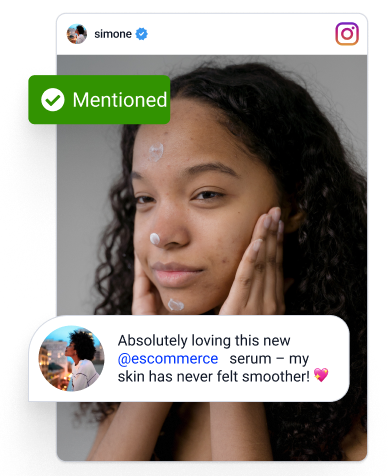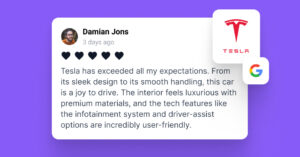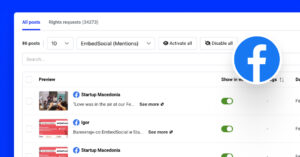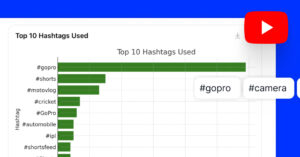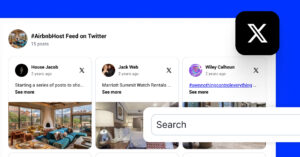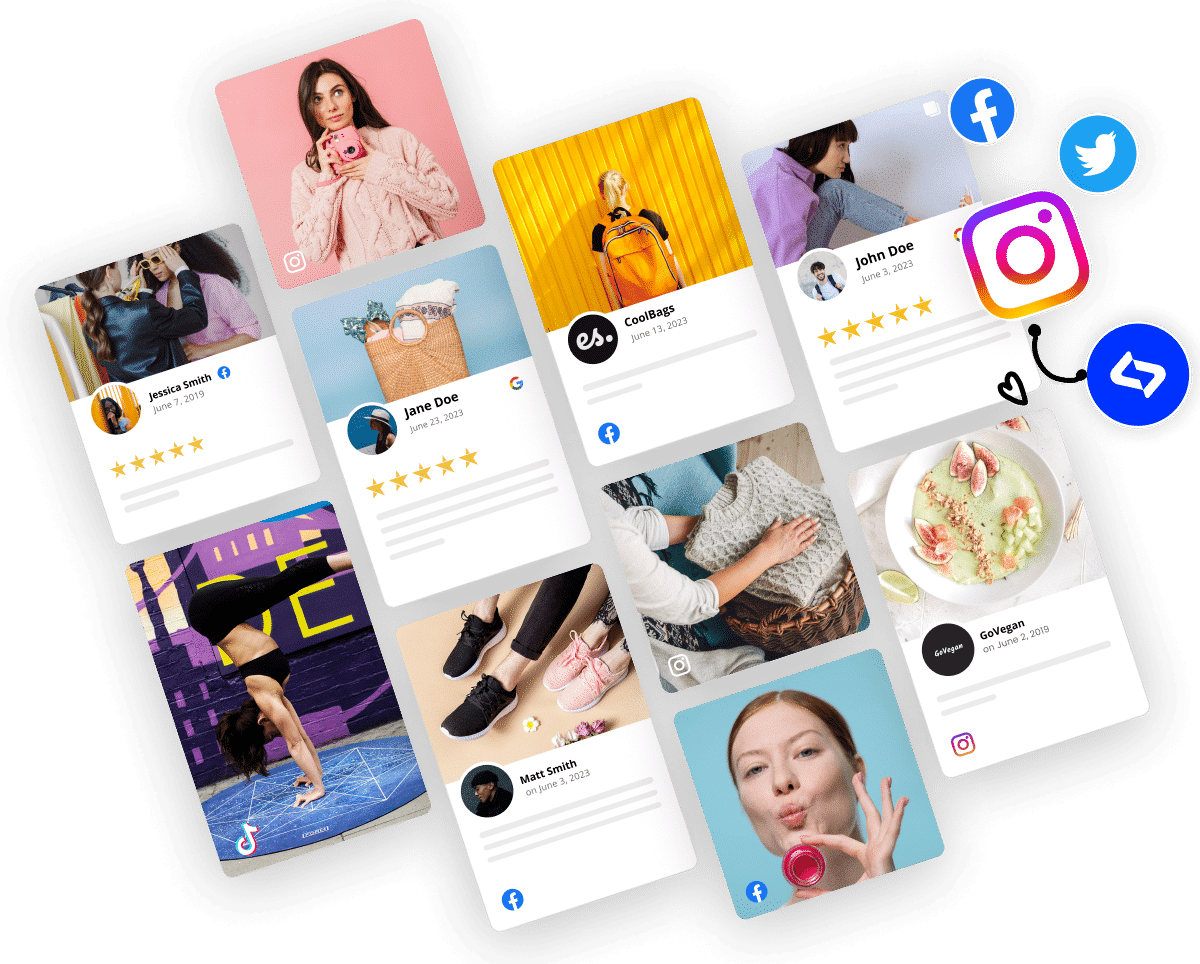Social search is becoming a key part of how people discover information and brands online, and it’s putting traditional search engines on the ropes.
You’ll see users (especially younger generations) turning to Instagram, Twitter, TikTok, and others to search for products, services, and answers—a shift that has opened up new opportunities for businesses to reach their audience in a more organic way.
For that reason, I explore how social search is reshaping the landscape and dive into how businesses can tap into this change with a social listening tool and boost their visibility.
What is social media search & how does it work?
Social media search refers to the act of searching for content, people, brands, or trends directly within social platforms. These platforms have integrated powerful search functions, allowing users to find what they’re looking for with just a few clicks.
Unlike traditional search engines, social media search engines prioritize content that’s popular, engaging, or highly relevant to the user’s interests.
Whether it’s Instagram hashtags or trending Tweets, social search (or social listening) gives users a personalized way to discover content that’s most likely to resonate with them. As for businesses, this is an opportunity to get discovered.
Social platforms use algorithms to analyze user behavior, engagement, and preferences. That way, when you search with keywords, hashtags, or topics, you get results based on your activity, social interactions, and content relevance.
Why social search goes beyond traditional search engines?
Free social search is the new SEO buzzword since it’s natively embedded in all the popular social media platforms, including Facebook, Instagram, TikTok, and more.
As digital behavior shifts, social media platforms are emerging as powerful search engines, challenging the dominance of traditional search engines like Google.
In fact, Google now accounts for only 63.41% of the traffic, with social media platforms like YouTube, Instagram, and TikTok taking an increasing share:
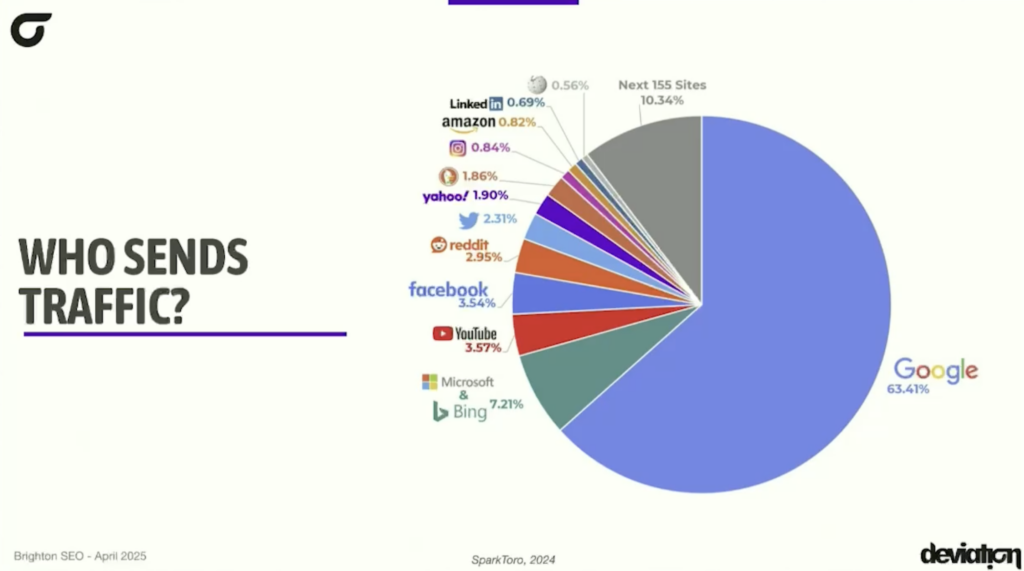
Source: SparkToro, 2024
A significant reason for this is the targeted, personalized nature of social media search. Unlike Google, where search results tend to be relatively uniform across users, social media search results are shaped by individual preferences and interactions, delivering a tailored experience.
Algorithms on platforms like TikTok and Instagram know users so well that they can suggest exactly what they’re looking for, even before they type it in.
Recent studies show that younger generations, in particular, are increasingly turning to social media for their search needs.
For example, Gen Z is now 25% less likely to use Google for search compared to Gen X, preferring platforms like TikTok and Instagram.
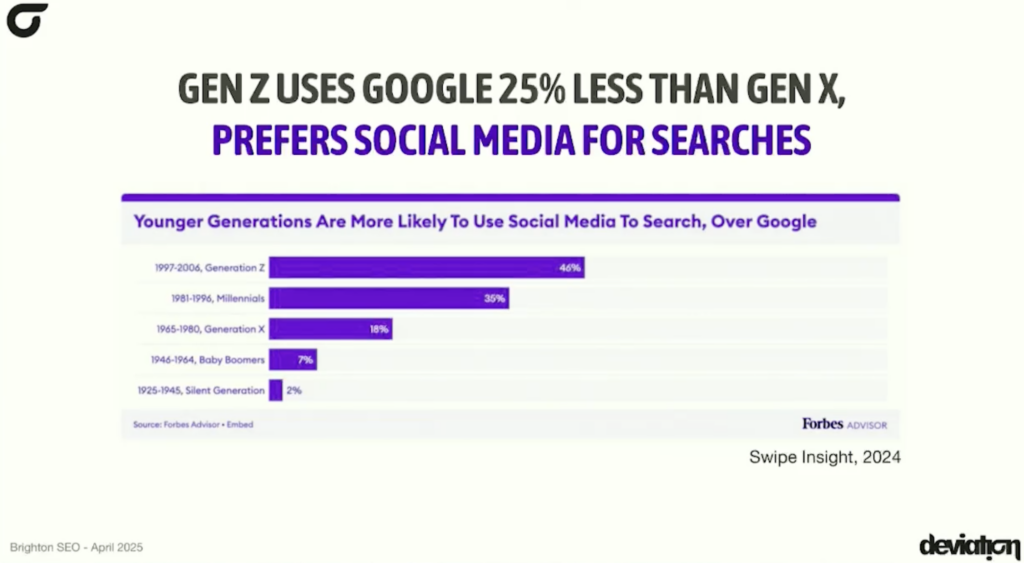
Source: Swipe Insight, 2024
In fact, 40% of young people looking for a restaurant bypass Google Maps, opting instead for social media platforms where real-time content reigns supreme:
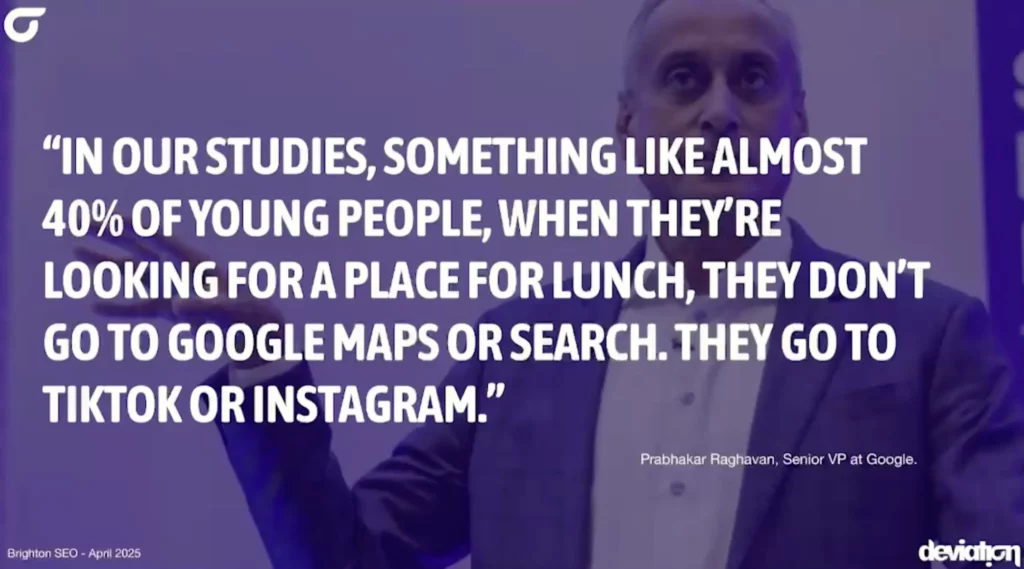
The shift to search in social media is not just a trend among the youth. 76% of consumers have used social media to search for products, brands, and experiences.
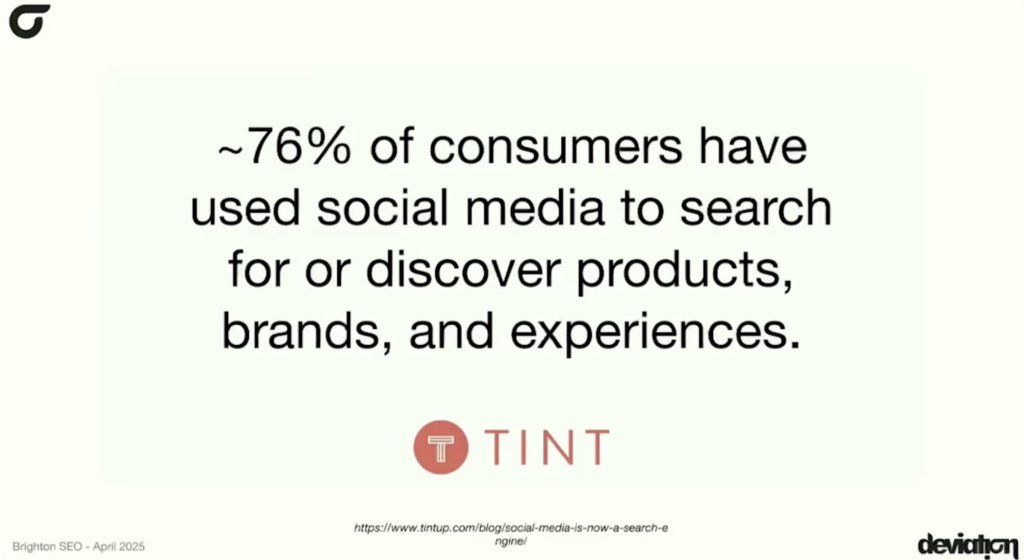
Source: Tint 2025
This rise in social search reflects a broader cultural shift toward discovering new information in a more engaging, authentic, and visually driven environment, and social media provides that new and immersive, multi-touchpoint experience.
As you can see, with these evolving consumer habits, you must adapt your brand. The rise of social search signals a need for businesses to establish and optimize their presence on social media platforms, ensuring they’re discoverable.
What are the benefits of social search?
Social search offers several key advantages for businesses looking to enhance their online presence. It helps improve brand visibility by reaching users where they’re already engaging with content:
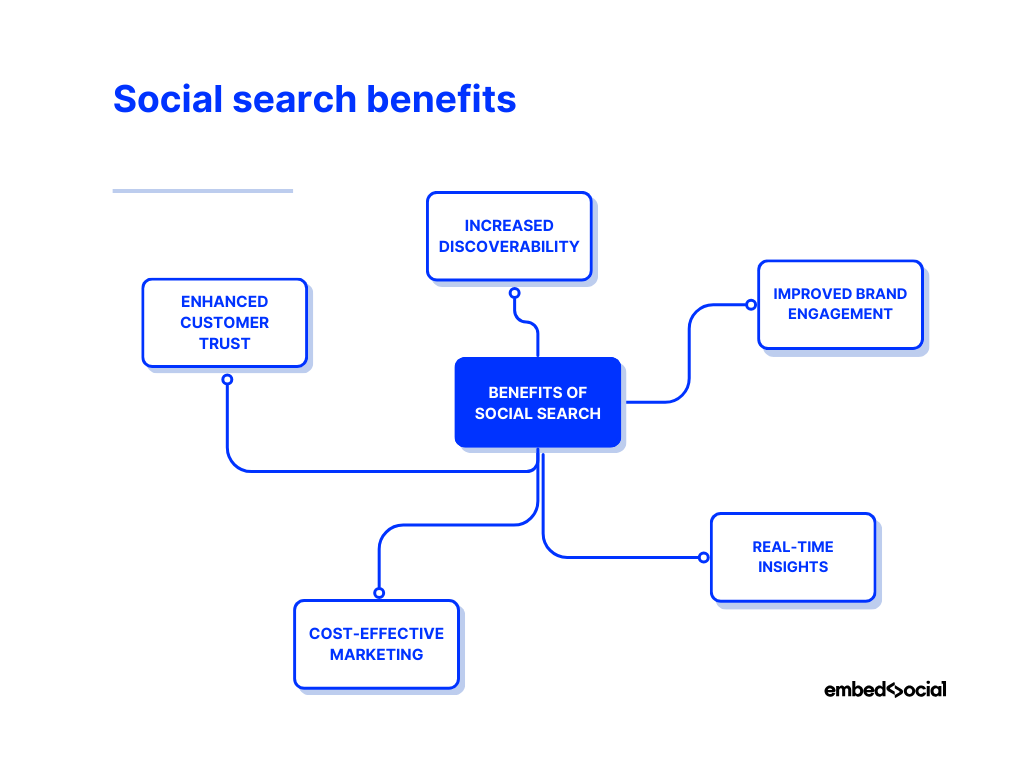
- Increased discoverability – social search makes it easier for users to find your brand through hashtags, keywords, and trends;
- Improved brand engagement – by optimizing your content for social search, you can foster greater interaction with your audience;
- Real-time insights – social search enables businesses to tap into trending topics and conversations, providing valuable market intelligence;
- Cost-effective marketing – social search reduces the need for traditional paid search ads, allowing businesses to grow organically;
- Enhanced customer trust – when users discover your brand through social media content, it builds a sense of authenticity and trust via peer validation.
Leveraging social search can ultimately help you reach more potential customers, increase your brand awareness, and conduct effective market research.
Social search engine vs social search tools
Now, let’s go over the difference between social search engines and social search tools, so you need to know how to leverage both for your business growth.
Social search engines
These are the main platforms and services where most of us spend our time socializing with our peers, and most of them have a built-in search functionality.
Typically, they include search features that allow us to find content, people, or brands. Also, they serve you content that aligns with what you engage with.
Nowadays, they serve as hubs for discovery, not just for socializing but also for seeking social commerce products, trends, or answers, and even
These are the most popular social search engines nowadays:
- Instagram – search by hashtags, keywords, or location. Instagram’s algorithm delivers personalized content based on user preferences and engagement history.
- Twitter (X) – users search for hashtags, keywords, and trending topics. X has evolved into a platform where users not only tweet but actively search for real-time updates, news, and discussions.
- TikTok – the search bar is used for finding videos, trends, and even creators. TikTok’s search function is heavily dependent on trends and engagement, making it an excellent social search engine.
- LinkedIn focuses on professional content. Users search for people, job postings, companies, and industry insights.
- YouTube – while primarily a video platform, its search engine helps users discover video content through keywords and tags, contributing to social search.
These platforms have become social search engines because users interact with content and also use the search features to discover new information.
Social search tools
As for social media search tools, we’re talking about third-party software designed to help businesses, brands, and individuals to monitor, track, and analyze social media content and interactions to learn about their customers.
These tools typically provide deeper insights into what is happening across various social media platforms in real-time, as they help you extract meaningful insights.
Examples of social search tools include:
- EmbedSocial – offers various social listening tools and functionalities for businesses that want to track mentions, hashtags, and trends across different social media platforms in order to improve their online presence, gauge customer sentiment, and measure the effectiveness of their marketing campaigns.
- Sprout Social – has social listening and search features, providing businesses with tools to track specific keywords, hashtags, and brand mentions across platforms like Instagram, Twitter, Facebook, and LinkedIn.
- Hootsuite – known for its social media management and social media listening that helps track specific conversations or keywords across multiple platforms.
- Brandwatch – a robust social listening tool that helps track mentions and trends on a large scale, offering insights for competitive analysis and customer sentiment.
These tools typically act as social search assistants. They don’t provide search functionality within social platforms themselves, but they help you aggregate data and provide insights about social media search behavior.
EmbedSocial – a social search tool with advanced AI capabilities
When it comes to scaling your social media listening without any worries, EmbedSocial should be your top choice as it offers everything you need for that.
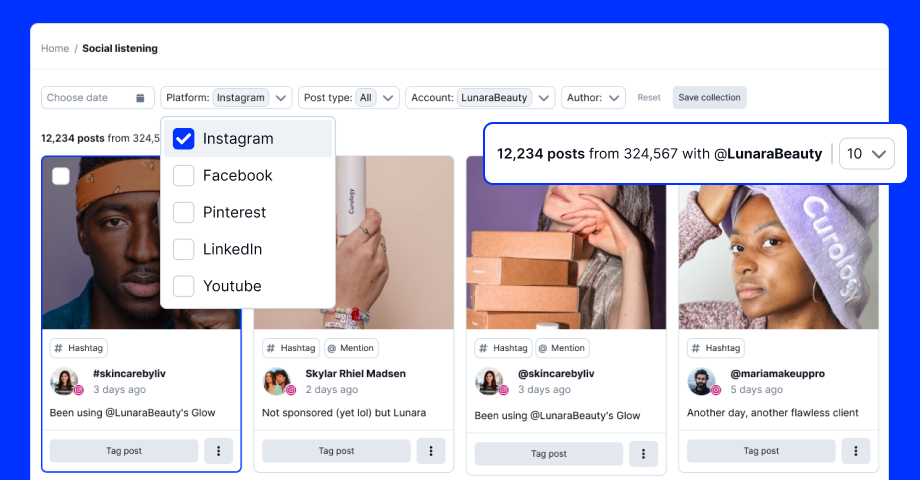
Instead of manually doing your social media monitoring for mentions, hashtags, keywords, and more, you can connect your platforms with EmbedSocial to get the data automatically.
However, unlike a social search engine, which is used by individual users to search for content, EmbedSocial enables you to listen to what people are saying about you and your industry in real time.
This makes it a valuable tool for gaining insights into customer sentiment, monitoring brand reputation, and identifying trending topics.
How to automatically do social search at scale using EmbedSocial?
Using EmbedSocial for your social listening and social search needs is extremely straightforward, as you can add and organize all your social media sources in seconds:
Once you connect all sources you care about, allow EmbedSocial to collect the relevant data, which you can plug into our free Brand Sentiment Analysis tool or use the built-in ‘Trends’ function of the platform.
Before you start, however, create a free EmbedSocial trial account to access ‘Trends’. Then, follow these simple steps:
Step 1: After logging in, connect all your social media sources under ‘Sources’.
Step 2: Next, download the data needed for the social media analysis under ‘Reports’.
Step 3: Upload the file to get the analysis numbers and charts under ‘Trends’.
That’s all you had to do! Once you are done, you’ll get all this data structured concisely:
- Total posts
- Unique authors
- Date range for the posts analysed
- 10 most popular hashtags
- Top 10 authors
- Content by type: video, image, carousel, text
- Content by platform
- Most used keywords
- Sentiment analysis
- Post timeline
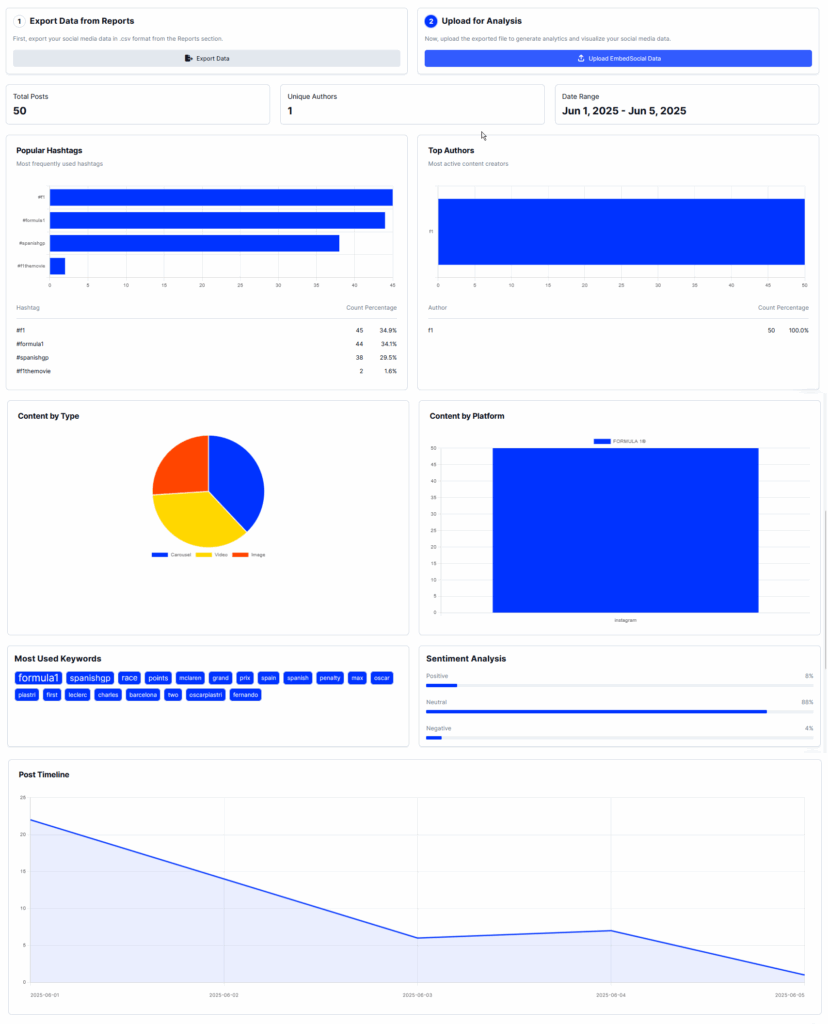
As it stands, our advanced social media listening platform can help you collect and analyze social media data from all of the following platforms:
Monitor Facebook mentions
Want to know what everyone is saying about your business and/or brand on Facebook? You can find all mentions of you in everything from posts and stories to individual comments added anywhere on Facebook. Learn how to monitor Facebook.
Track Instagram hashtags and mentions
You can also track all your Instagram mentions and any hashtags relevant to your niche as they appear on Instagram. That way, you’ll both stay in the loop of what’s happening around and about you. Learn how to monitor Instagram.
Monitor Threads mentions and keywords
X is another very important platform for brands and businesses due to its massive reach. And how do you sift through all that content? You’ve guessed it! You add your Threads sources to EmbedSocial. Learn how to monitor Threads.
Track YouTube hashtag
YouTube does offer valuable insights, as it’s the largest video-based platform in the world. So, you should want to check what’s being said there regularly. Thankfully, EmbedSocial helps you with that. Learn how to monitor YouTube.
Monitor X (Twitter) hashtags, mentions, and keywords
Regarding X, EmbedSocial allows you to track everything: hashtags, mentions, and keywords. That way, you’ll know everything there is to know about you and your niche! Learn how to monitor X.
What else do you need, right? With EmbedSocial, you can search social media for free and do it all from a single dashboard.
Plus, you can combine all these sources to get a holistic view of your online brand image, telling you what you’re doing right and wrong. It also serves as a social media account finder, as you only type in an account name.
How to optimize your brand for social search? 5 best practices
To make the most of social search and improve your brand visibility, consider these best practices to help you stand out and engage with your target audience more effectively.
1. Use relevant hashtags
Hashtags are a crucial part of social media search, as they help categorize your content and make it discoverable by a broader audience. Research trending and niche-specific hashtags that align with your business or industry, and incorporate them naturally into your posts.
Real-life scenario: A small fashion retailer consistently uses trending hashtags like #SustainableFashion and #EcoFriendlyStyle in their Instagram posts. This strategy has helped them gain visibility in a growing market of eco-conscious consumers, increasing both engagement and sales.
2. Optimize your profile
Your social media profile is often the first interaction users have with your brand. To improve your chances of appearing in relevant searches, ensure that your profile is complete, informative, and optimized for keywords. Include your brand’s unique value proposition, location tags, and relevant categories to improve your chances of being discovered in searches.
Real-life scenario: A local bakery optimized their Facebook profile by adding their location, using keywords like “fresh baked goods” and “artisan bread,” and linking to their online store. This optimization made them appear in local searches for bakeries, driving foot traffic and online orders.
3. Engage with followers
Engagement is one of the most important factors for boosting your content’s visibility in social search. Actively responding to comments, liking posts, and starting conversations not only boosts user interaction but signals to social media algorithms that your content is relevant and engaging.
Real-life scenario: A fitness coach regularly engages with followers by responding to workout questions, liking their posts, and sharing success stories. This consistent engagement has resulted in higher ranking in social searches, helping her build a loyal online community and attract new clients.
4. Leverage multimedia content
Multimedia content such as images, videos, and interactive posts tend to perform better in social media searches. These types of content grab attention, encourage interaction, and are favored by algorithms across platforms like Instagram, TikTok, and YouTube.
Real-life scenario: A travel agency started posting short, engaging travel videos and destination reels on Instagram. Their visual content, paired with popular travel hashtags, led to an increase in social search visibility, attracting a wider audience and generating more bookings.
5. Post consistently
Consistency is key in social search optimization. Posting regularly keeps your brand relevant and ensures that your content remains visible in social media feeds and searches. A steady stream of content signals to algorithms that your profile is active and engaged.
Real-life scenario: Some social media influencers increased their follower count by 30% after committing to posting daily makeup tutorials. Their consistent content made them more visible in both search results and the algorithm’s “Explore” page, ultimately growing their audience and brand partnerships.
Bonus tip: Look for free social search tools
Social search tools can help businesses track and monitor their performance in social media searches. While many tools are paid, there are also free options available that can provide valuable insights without the need for a budget.
For example, EmbedSocial’s Social Listening Tool allows businesses to track mentions, hashtags, and trends across various social media channels without any cost. Using these free tools can give you a competitive edge and help you optimize your social search efforts.
Conclusion: Take action with social search!
Brands need to start thinking about social search yesterday! After all, social platforms have evolved to the point that they’ve become powerful search engines and places where we share our memories.
Global search is a fast-evolving landscape, and you need to start adapting your brand to the new reality of social search as soon as possible!
After all, you want to sell your products and services where the audience is, which right now are platforms like Instagram, TikTok, Facebook, and such.
I’m not saying you should disregard SEO, but you should also consider the visibility and engagement you can and should get on social media.
That’s how you get ahead of the competition, and if you don’t believe me, just check out any popular brand’s social media presence.
There’s a lot to do: sign up for a social media monitoring tool like EmbedSocial, optimize your social media profiles, use the right hashtags, engage with followers, and leverage multimedia content, and you can significantly enhance your presence.
Start implementing these best practices and exploring free social search tools today to maximize the benefits of this growing trend!
FAQs about social media search
What is social media search?
Social media search refers to the process of finding content, users, brands, or trends within social media platforms. Users can search for posts, hashtags, social media accounts, and locations to discover relevant content and interactions.
What is the best free social media search?
One of the best free social media search tools is EmbedSocial’s free sentiment analysis tools, which allow businesses to track mentions, hashtags, and trends across various social platforms without any cost. It helps you monitor your brand’s presence and engagement in real time.
What is a social media search tool?
A social media search tool is a software or platform that helps businesses and marketers track and analyze content, hashtags, mentions, and trends across social media platforms. These tools provide valuable insights for improving social media marketing strategies and boosting brand visibility.
How can businesses benefit from social search?
Businesses can use social search to improve brand visibility by being discovered through relevant hashtags, keywords, and trending topics. It allows businesses to connect with their audience, track brand sentiment, and stay ahead of trends.
How do I optimize my content for social search?
To optimize for social search, use relevant and trending hashtags, post engaging multimedia content, and ensure your profile is fully optimized with keywords. Consistently engaging with your audience and posting valuable content can also improve your ranking in social searches.
